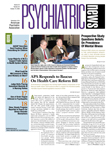After giving birth to her baby girl Summer, and while her family was admiring the new arrival, Melanie Blocker Stokes grew very quiet.
“I knew right away something was wrong,” Melanie's mother, Carol Blocker, recalled. “I said, 'Melanie, what's the matter?' But she was just staring at the ceiling.”
Later, at home with Summer, Melanie told her mother that she thought the baby hated her and that all the neighbors knew she was a terrible mother.“ She told me she was going to die, and there was nothing I could do to stop her,” Carol Blocker said. “She asked her brother for a gun.”
A couple of hospitalizations later, Melanie Blocker Stokes did commit suicide.
It was only after her death that Carol Blocker began to learn about postpartum depression and psychosis. She took her newfound knowledge and her daughter's story to Chicago Rep. Bobby Rush (D-Ill.), who introduced the Melanie Blocker-Stokes Postpartum Depression Research and Care Act.
That was eight years ago, and the bill, which would fund research and targeted grants for treatment services for individuals with postpartum depression (PPD) and psychosis, has yet to become law. The House passed its version of the bill in 2007, and the Senate version is now in the Committee on Health, Education, Labor, and Pensions.
Michelle Dirst, deputy director for Senate affairs in APA's Department of Government Relations, said that with health care reform consuming Congress's time and energy, the bill won't be considered separately but could be passed as part of whatever reform package is signed. At press time, the bill was included as an amendment to the health reform package unveiled in late September by Senate Finance Committee Chair Max Baucus (D-Mont.). Dirst also said it was possible the bill could be “hot lined”—Congressional jargon for fast track approval of legislation that has no significant opposition.
Certainly, the goal—research on and treatment of PPD—would appear to be unimpeachable. “Postpartum depression affects probably well over 10 percent of women in this country, and it has demonstrable ill effects on mother and child,” said APA past President Nada Stotland, M.D., who testified in support of the bill before Congress in 2007.
Yet it has encountered some curious roadblocks along the way. Antipsychiatry groups have cropped up on the Internet stating that the legislation would mandate the use of drugs. “Utterly ridiculous” is how Stotland reacted. “It's another scare tactic by antipsychiatry forces. Women are not going to be coerced into taking any treatment they don't want.”
A provision in the original bill calling for screening of new mothers in states that received grants for treatment under the bill was removed in the face of opposition. That provision said that states receiving grants“ shall ensure that new mothers, during visits to a [licensed health care professional] within the first year after the birth of their child, are offered screenings for postpartum conditions by using the Edinburgh Postnatal Depression Scale (EPDS) or other appropriate tests. If the results of such screening provide warning signs for postpartum conditions, the new mother shall be referred to an appropriate mental health care provider.”
In a letter to the editor of Time magazine, which published an article earlier this year focusing on PPD and concerns around mandated screening, APA and representatives from the American College of Obstetricians and Gynecologists, American Psychological Association, Association of Women's Health, Obstetric and Neonatal Nurses, and the President's Advisory Council expressed support of the bill and the need for early identification, but pointed out that the newly introduced legislation did not call for mandated screening.
“Postpartum depression is treatable, but first it must be recognized,” the group wrote. “Since many young women see the doctor only during pregnancy and routinely just once after delivery, those visits are a special opportunity for evaluation. Depression can be successfully treated with psychotherapy, medication, or a combination of the two. Every new mother who is depressed should have access to quality, affordable diagnosis and treatment.
“[T]he article focused on the screening of new mothers, but the legislation it discusses does not include screening. Instead, Congress recognizes the importance of this issue with the introduction of the Melanie Blocker Stokes MOTHERS Act, which would authorize research to better understand the causes and treatments for postpartum depression and provide support to women suffering from postpartum depression and psychosis.”
Dirst said that the prospects for passage are muddied by the all-but-exclusive focus by Congress on health care reform, but she urged APA members to contact their representatives in support of a bill that has already been lingering for eight years.
The Melanie Blocker Stokes MOTHERS Act can be accessed at<http://thomas.loc.gov> by searching on the bill number, S 324. ▪
